General
MakSPH Celebrates Professor Bazeyo at 28 years of service
Published
4 years agoon
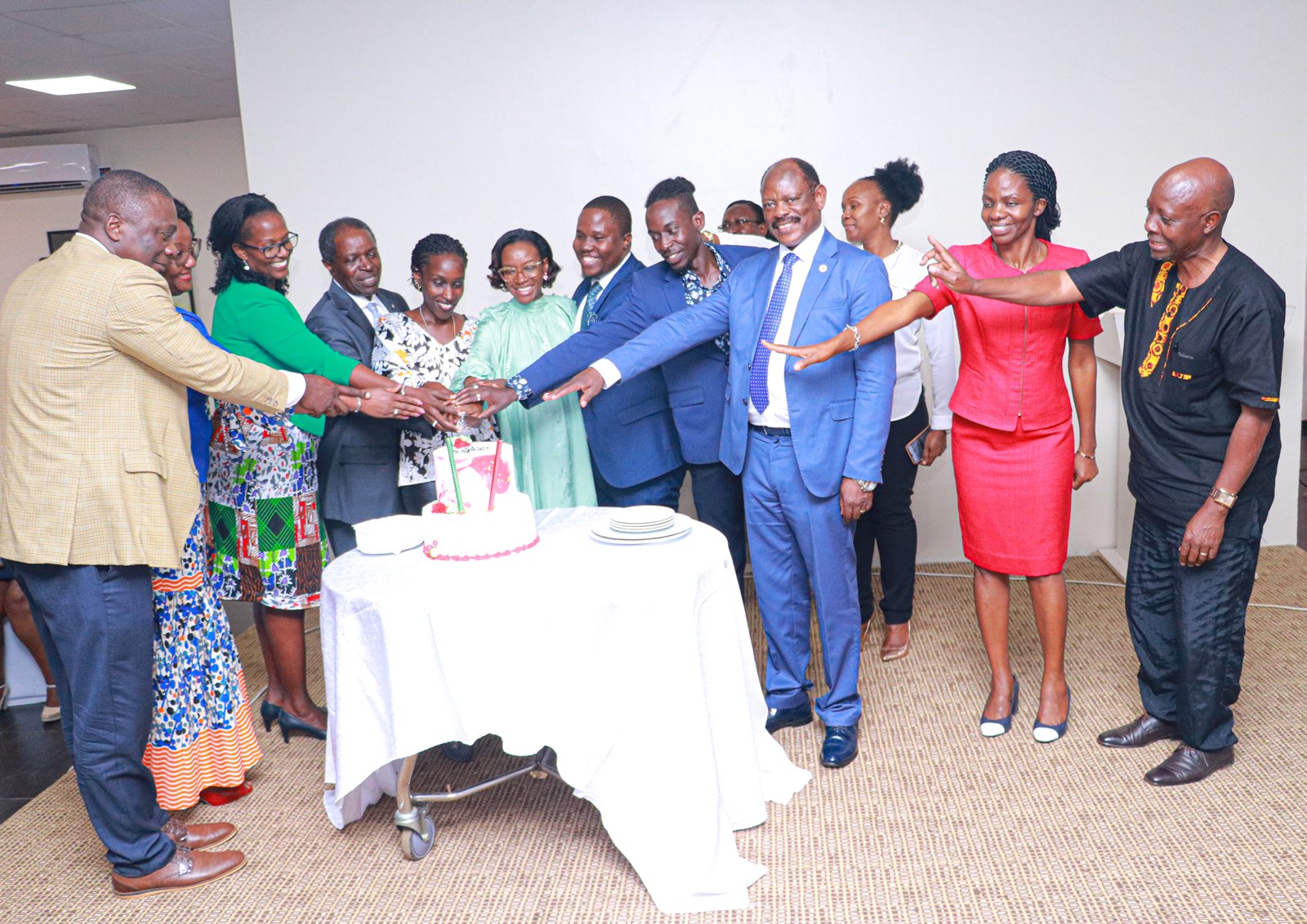
After an illustrious 28-year career, Makerere University School of Public Health’s Former Dean Dr. William Bazeyo officially retired from university service.
Dr. Bazeyo, a Professor of Occupational Medicine walked onto Makerere University in August 1993 after being appointed as a Lecturer of Occupational Health at the School of Public Health.
At a Dinner organised by the Makerere University School of Public Health’s Department of Disease Control and Environmental Health held on Tuesday August 9 at Skyz Hotel, Kampala, Makerere University Vice Chancellor Professor Barnabas Nawangwe said Professor Bazeyo has selflessly served and made “incredible contributions” to the century old institution and the country.
“Professor Bazeyo is one of the very few Ugandans with whom I have had a lot of pleasure to work with. He is one of the very few people who genuinely loves their country. He is a true patriot. One of the things I found pleasure in working with Prof. Bazeyo is he is very open,” said Prof. Nawangwe.
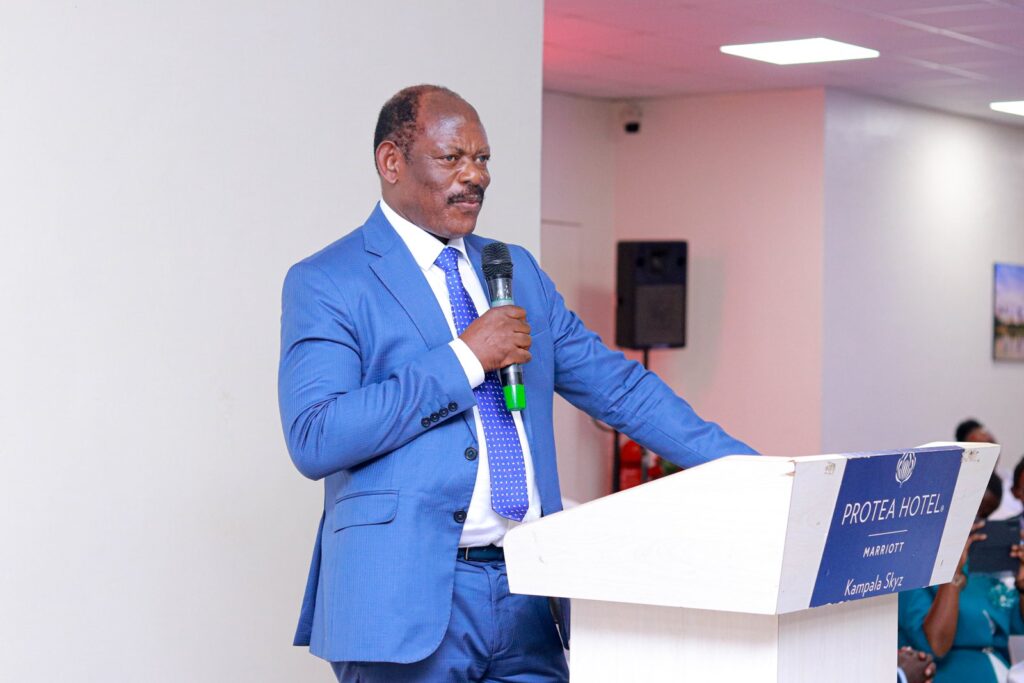
He adds that Professor Bazeyo was a true asset attesting to his leadership abilities during the time he worked as Deputy Vice Chancellor, Finance and Administration.
“In that very short time that we worked together, we gained so much as Makerere University. We did so many things that had failed Makerere University in over 30 years. One time he told me I never take a no for an answer. Every assignment he goes on, he comes with an answer,” Prof. Nawangwe.
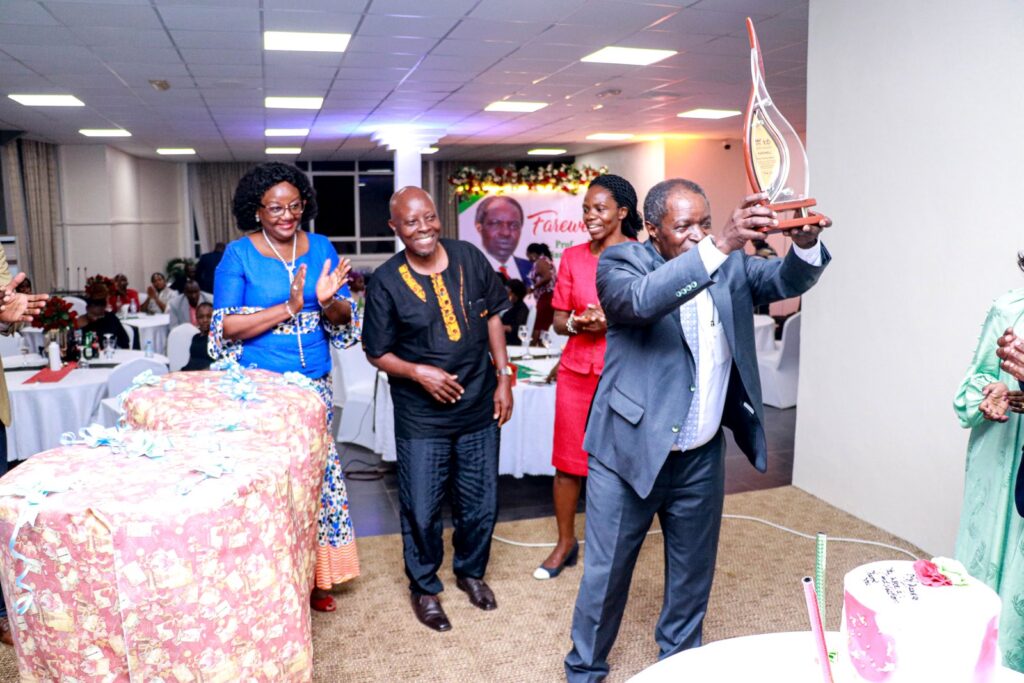
Among some of the achievements credited to Professor Bazeyo according to the Vice Chancellor was his great negotiation skills with government and several stakeholders that saw reduction of a long-standing debt from Ugx120bn to now less than Ugx.10bn.
The vice chancellor also urged staff to emulate Professor Bazeyo by having a positive attitude.
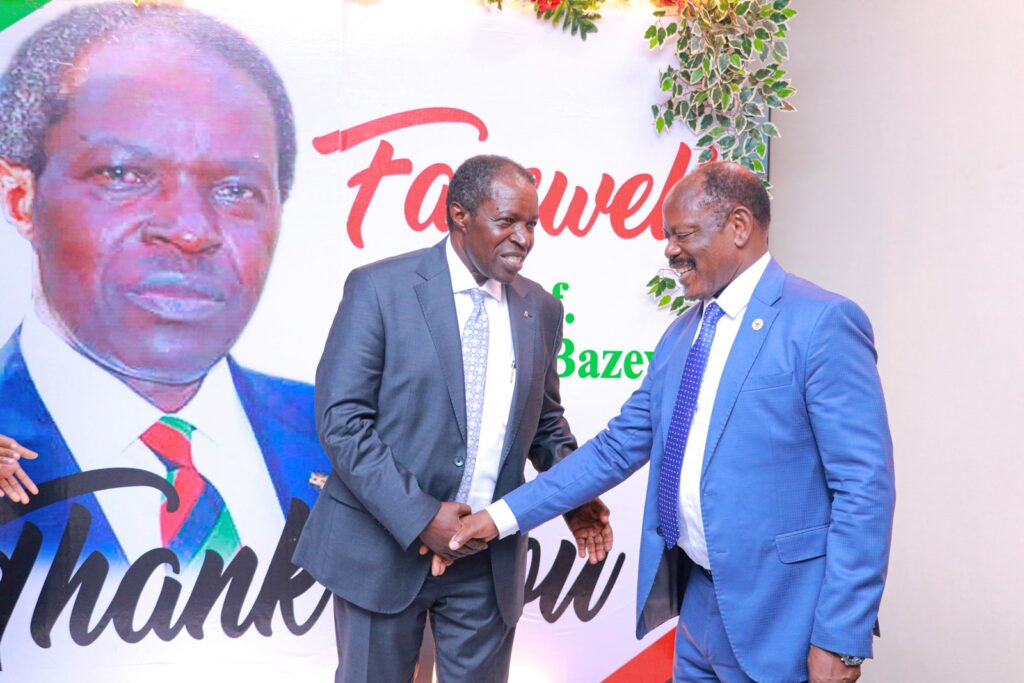
“He [Prof. Bazeyo] has demonstrated how much he loved Makerere University. Even when he left, he still comes and offers guidance. Thank you very much for having that kind of heart. It is very important to have a positive attitude to serve humanity,” Prof. Nawangwe.
Mrs. Lorna Magara, the Makerere University Council Chairperson described Bazeyo as a “larger-than-life” figure with a kind and generous heart.
“On this day Professor Bazeyo we celebrate the man you are. We thank God for who He has made you to be. God packages us uniquely. Just hearing the impact, you have had on so many lives, we thank you!” Mrs. Lorna Magara said.
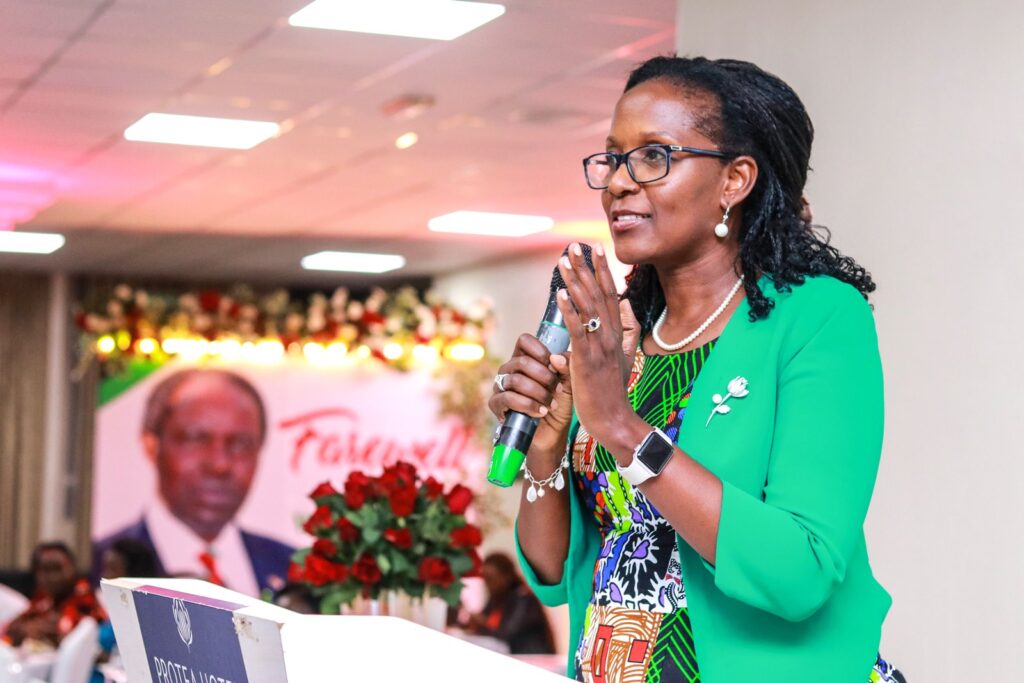
She further praised Prof. Bazeyo for being a down-to-earth person citing that that he easily identifies with ordinary people irrespective of his status in society.
“Professor dines with the rich and the top of the tops but he will know the name of the person who is at the door. He will know the lady in the kitchen. Thank you for a large heart and for knowing even those that are faceless,” says Mrs. Magara.
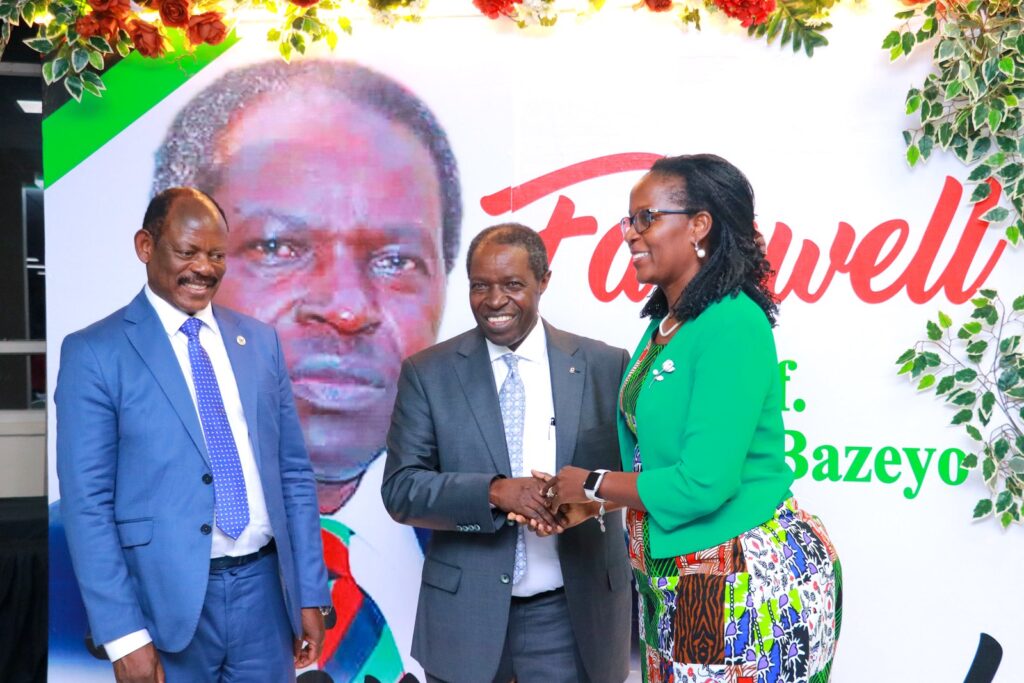
On her part, Dean, Prof. Wanyenze hailed Prof. Bazeyo for his significant contribution to Makerere University and particularly the School of Public Health.
“If you had not done your part, we couldn’t be where we are today. I picked on from you and everything you left I was able to move on with it because I was building on a strong foundation. I hope you will continue to support us,” said Prof. Wanyenze.
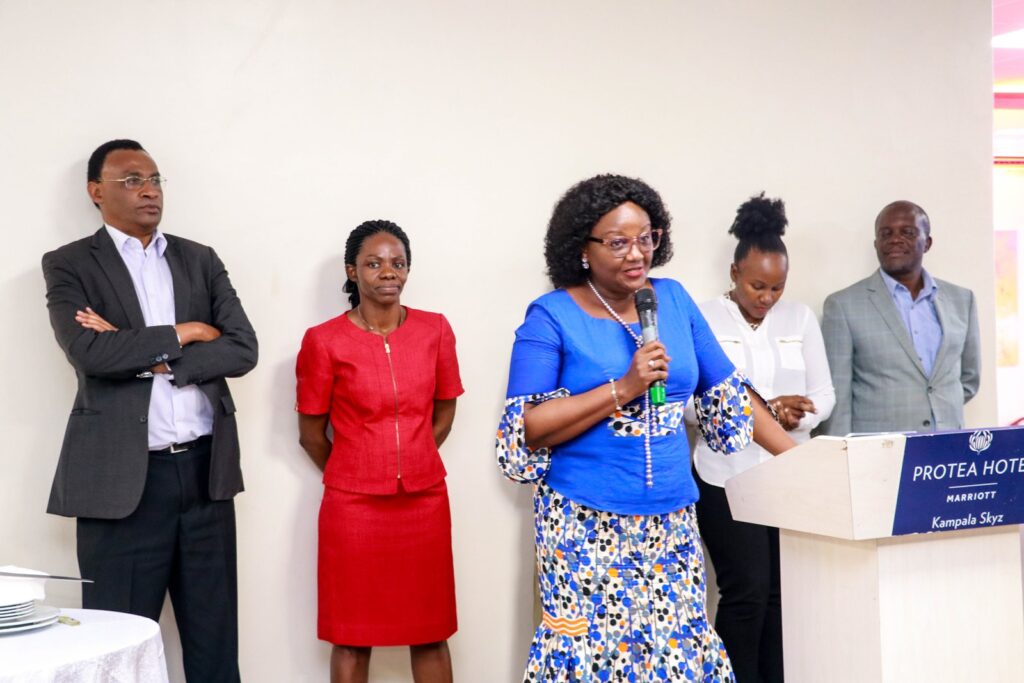
She emphasized that the School of Public Health has been privileged with successive strong and progressive leadership that has continued support the School even when they leave. She thanked the previous leadership of the School including Prof. David Serwadda, Prof. Fred Wabwire-Mangen, Prof. Kakitahi, Prof. Bukenya, Prof. Namboze, among others for their incredible leadership.
“People who have been part of MakSPH are always a part of us—please keep with us. We pray for excellent health for you and for a peaceful retirement.” Prof. Wanyenze said.
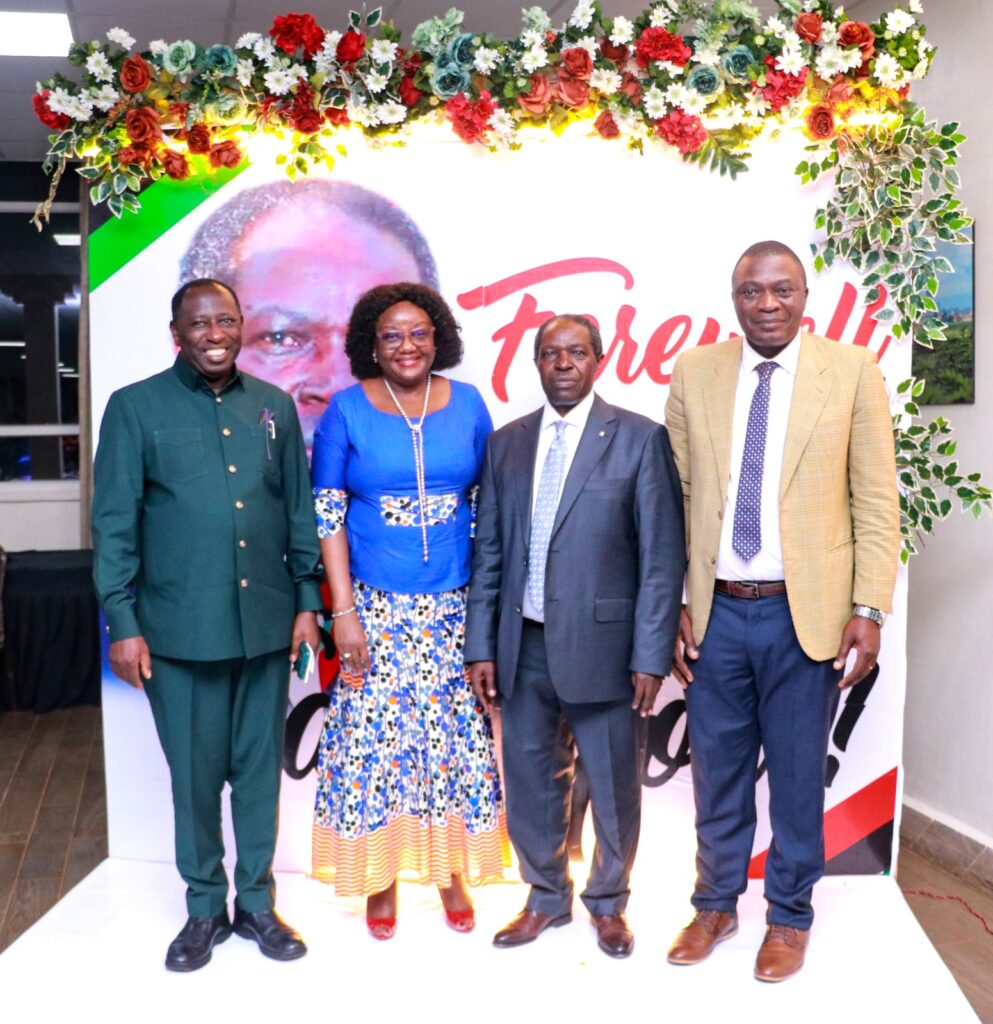
Representing the Principal, Professor Isaac Kajja, the Deputy Principal of the Makerere University College of Health Sciences urged the School of Public Health not to lose a person of Prof. Bazeyo’s stature.
Prof. Kajja praised Professor Bazeyo for his kindness and his passion for farming.
“I briefly interacted with Prof. Bazeyo as a Student in my 4th year medical school. But he left something to us. He was kind to us and I remembered how kind you are until I started working with you. Indeed, what these people from School of Public Health have said is right. He is a very kind gentleman. Sincerely that kindness, you will not go away. Even if you try to leave Makerere, with that kindness I know you will come back,” Prof. Kajja said.
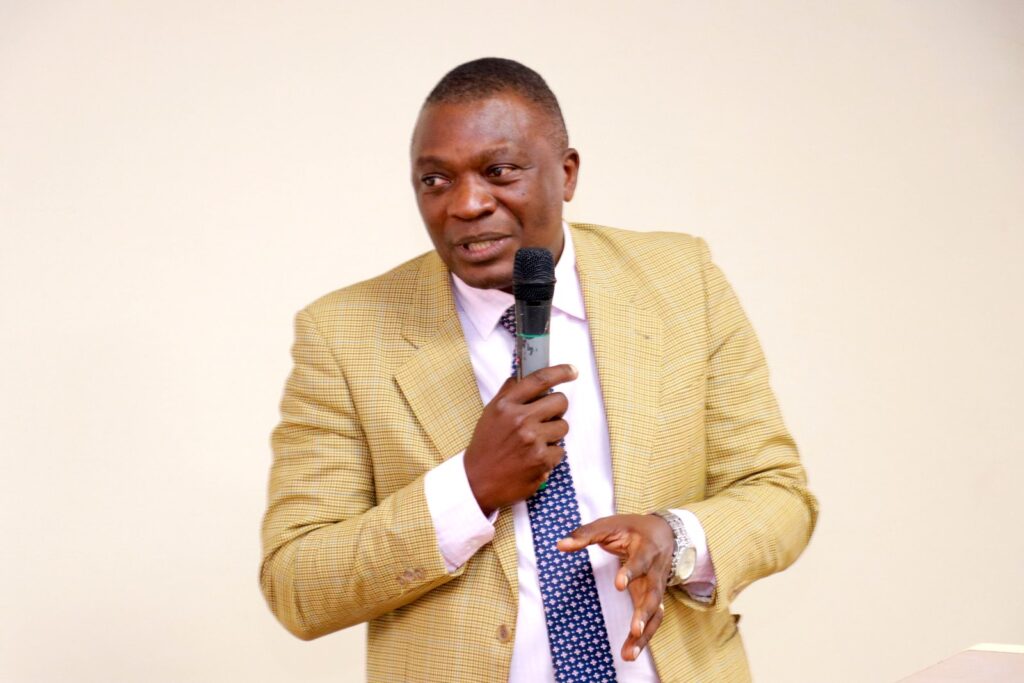
He also requested Prof. Bazeyo to continue working and support the School of Public Health and the entire College of Health Sciences.
Prof. Kajja equated the gesture of thanking its staff and those retiring to his former Mentor’s advice the late Church of Uganda Archbishop Dr. Livingstone Mpalanyi Nkoyoyo who preached about thanking people always.
“It is extremely important to thank people in a timely manner. Immediately thank people when they are still available. That is what I learnt from Archbishop Mpalanyi Nkoyoyo. Why am I saying this? Professor Rhoda Wanyenze and your team, thank you for thanking Professor Bazeyo in a timely manner. When I also leave, the office of the Deputy Principal please thank me. Organize a thank you for me. Don’t wait to thank somebody when we are burying him. Let us develop a culture of thanking people when they are still alive,” Prof. Isaac Kajja appealed.
Professor Bazeyo has been instrumental in fundraising for the new building for MakSPH. Prof. Rhoda Wanyenze revealed at the function that she inherited approximately 1.9bn Uganda shillings from Prof. Bazeyo for construction of the MakSPH building at his handover. She says this money has now increased to more than 12 billion shillings, thanking Bazeyo and the former leadership for having the School at heart.
What staff say about Bazeyo
Prof. David Serwadda, a former Dean of MakSPH says the School has for long dreamed of having a spacious home. “Infrastructure was always on everybody’s mind right from Prof. Gilbert Bukenya’s time through to Prof. Wabwire’s time and to date. Dr. William was very proactive in building and going through various stages of designs and also fundraising for the School.”
Prof. Serwadda says Dr. William Bazeyo was his successor as the Head of Department of Disease Control, his Deputy Dean as well as Dean.
“The School of Public Health has been lucky. Every leader that has come on as far as I can remember builds on the previous leaders’ achievement and the School of Public Health is where it is now because of contribution from each of the previous leadership. Professor Bazeyo definitely did build on,” says Prof. Serwadda.
Associate Prof. John C. Ssempebwa, a former Head of Department of Disease Control and Environmental Health congratulated Professor Bazeyo on his retirement and cited that Department had benefited greatly from his contribution.
“It was an honor to work with a person who was committed to the success of their co-workers. I have learnt a lot from working with you over the years. I do remember when you used to come to our offices mainly in the mornings to check on us how we are doing socially but also professionally. We really loved that and it encouraged us,” Dr. Ssempebwa said.
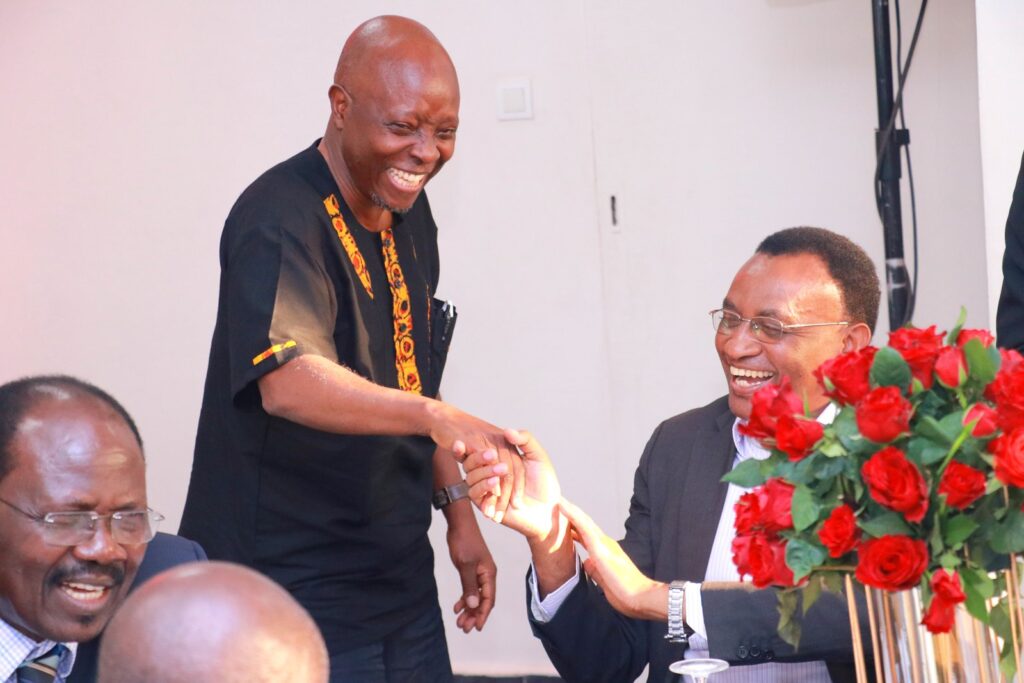
Associate Prof. Esther Buregyeya, the Head of Disease Control and Environmental Health Department just like Professor David Guwatudde hailed Bazeyo for his great lobbying skills that have seen the Department, School and University benefit immensely from the networks.
“As you usually say, I negotiate till I get YES for an answer, indeed Professor Bazeyo that is what you are,” said Dr. Buregyeya.
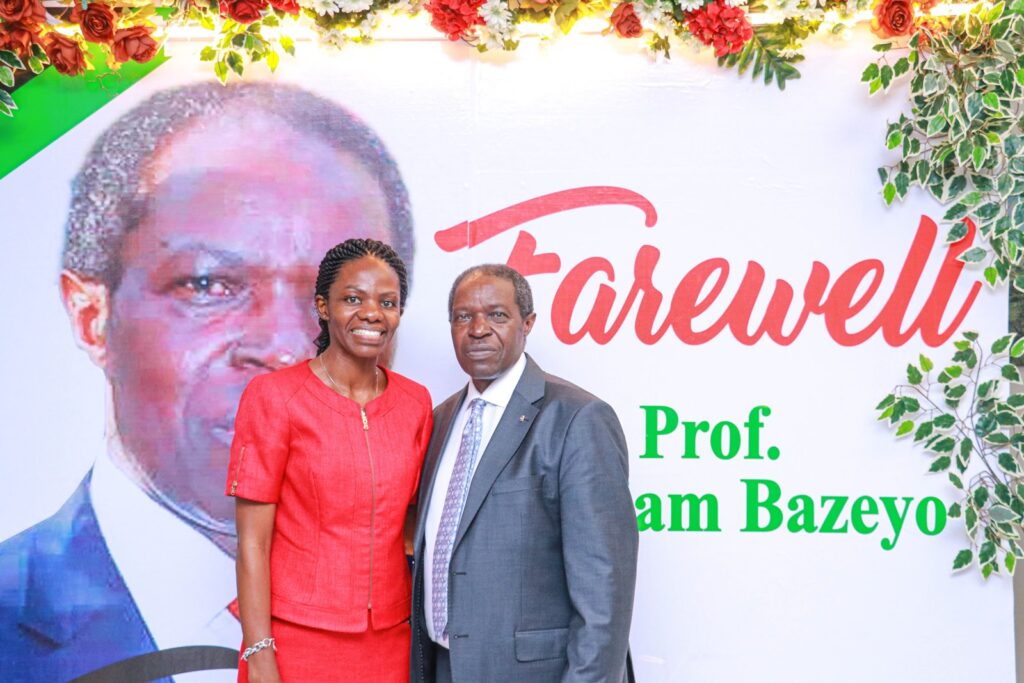
According to Dr. Lynn Atuyambe, an Associate Professor in the Department of Community Health and Behavioral Sciences, Professor Bazeyo’s reign at MakSPH saw a log growth in the grant portfolio, academic growth and finance.
Mr. Amos Ashaba Dembe, the internal auditor at MakSPH hailed Prof. Bazeyo for his availability to offer quick solutions and being able to network the School in the entire Makerere and across the various government institutions.
“He would have right and valid contacts at any one time you approached him with a challenge. Sometimes when we are implementing the researches that we manage, you may get stuck either because of policy gaps but whenever you would call on Prof. Bazeyo, he would have the right contacts,” said Ashaba Dembe.
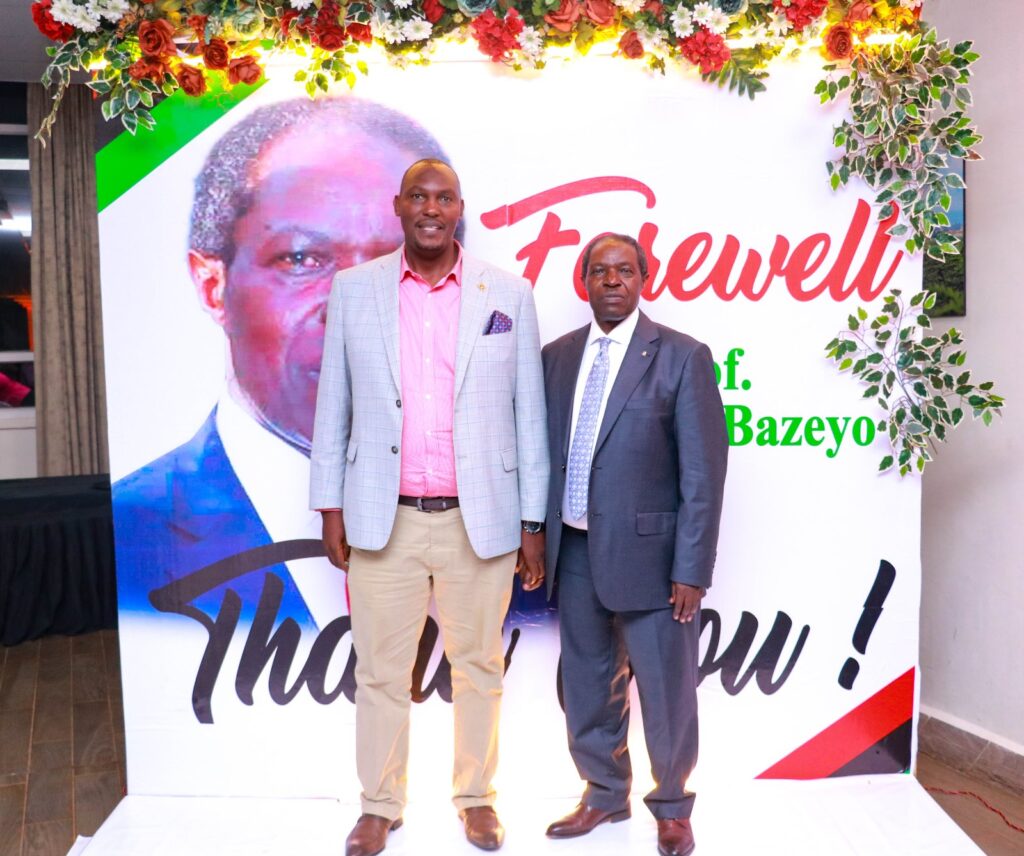
Dr. Fredrick Edward Makumbi, Associate Professor and former Deputy Dean thanked Bazeyo who through his ambitious targets nurtured and saw the establishment of the Staff SACCO which he said had benefited several staff.
In equal measure, Ms. Enid Kemari said; “I think this Sacco has not left us the same. Most staff who have joined this SACCO, their financial status has improved. We have been able to save, but also do some investments which I think is very good.”
Professor Christopher Garimoi Orach praised Prof. Bazeyo for being a result-oriented person; “Apart from fighting for what he believes in very firmly, William is a doer and focused on results. It is really very pleasant to work with him.”
Dr. Elizeus Rutebemberwa, Professor and Deputy Dean MakSPH says he learnt a lot during his time at the helm of the School as someone that wished to see everyone contribute.
“He once narrated how he went to China and visited a factory. In the evening as workers were leaving, each would say, I have been a contribution. And to me, the take home message was every day, one comes to work, one should not just take tea and breathe air but be a contribution to solving challenges facing our country,” Prof. Rutebemberwa.
Professor Bazeyo speaks out
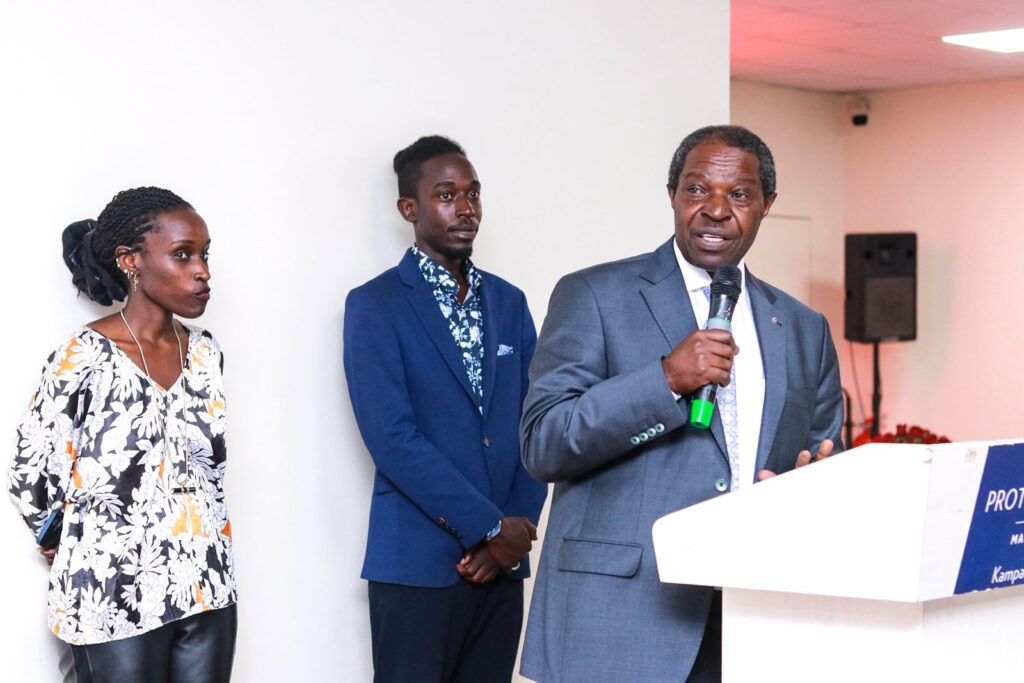
While delivering his remarks, Prof. William Bazeyo thanked Makerere University for the opportunity to serve the nation. He also urged all university staff to always leave a trail in all their work so that they are remembered for their good deeds.
“I want to thank God for this time. I listened to the memory lane and I have listened to what a lot of people have said and it brings me a lot of memories. I want to thank God again for our institution. That you come into an institution, it nurtures you. When the Vice Chancellor talks about these negotiations, meeting donors and so on. Not that you go and say I must! But you have that inside power that it is not yours,” Prof. Bazeyo highlighted.
“It is what you decide to be that you become. I want to thank the university management and council for approving the Master of Environmental and Occupational Health which I for long has been passionate about. If I was allowed, I would come and give some introductory lectures.
I want to thank the university for nurturing me and accepting me. I am not very simple. Some of you know. As they said I don’t take no as an answer and I don’t believe in failure. And I don’t believe that we can’t do a lot. I thank the University for having been patient with me, especially the Vice Chancellor for accepting me to be his Deputy,” Bazeyo says.
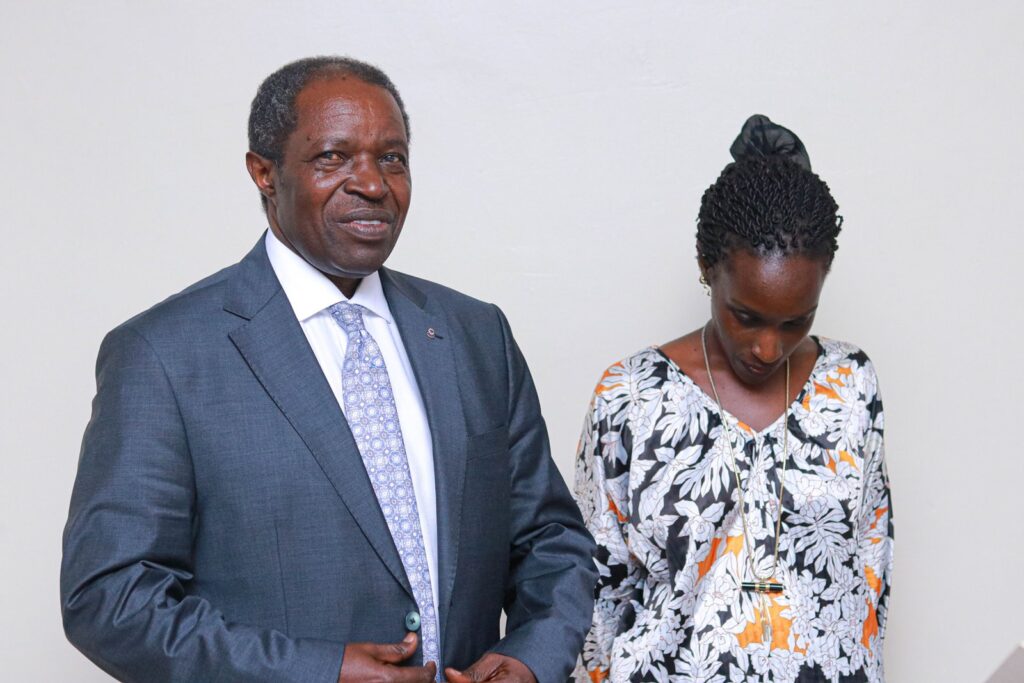
He thanked the School of Public Health, his mother Department for nurturing him and equally urged the staff to build networks.
“Professor Rhoda said money or resources do not make everything. Indeed, they don’t. Because all those things come from partnerships and friends. If you don’t have them, you have nothing. She has told us the partnerships that the School has, and that is why the School is ranked high. Let your address be that that means something to communities, humanity, to donors and to other institutions,” Prof. Bazeyo.
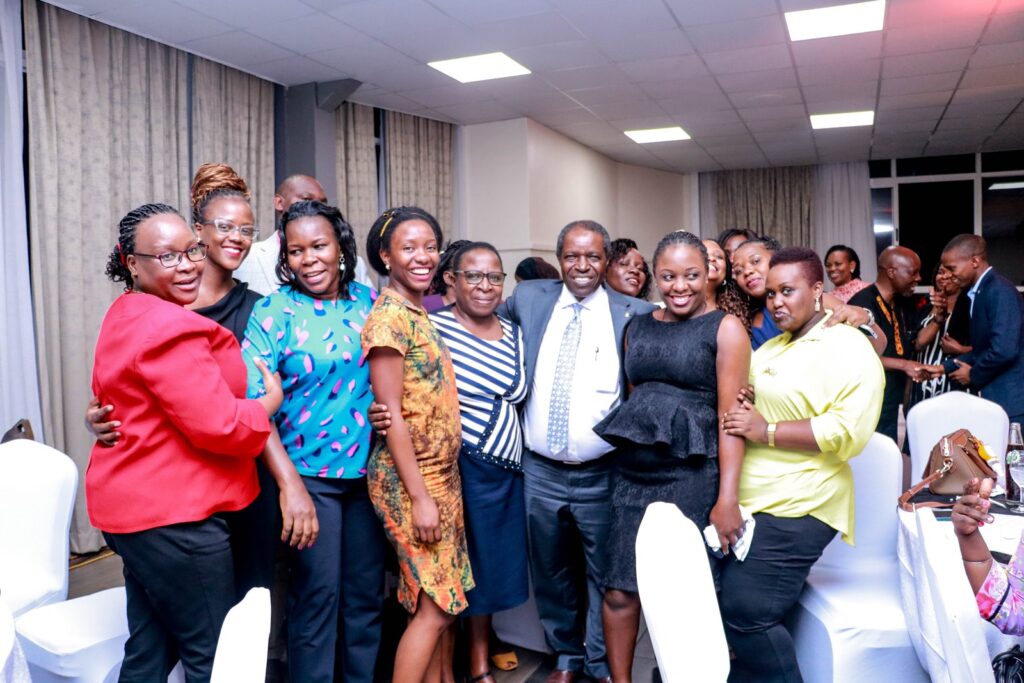
Professor Bazeyo apologized for errors and mistakes that he could have made while at Makerere University and asked for forgiveness from those that were hurt by his actions.
“I want to sincerely apologize if in the time I was at the School, I could have offended you either in writing, talking Forgive me those whom I hurt,” Bazeyo remorsefully said.
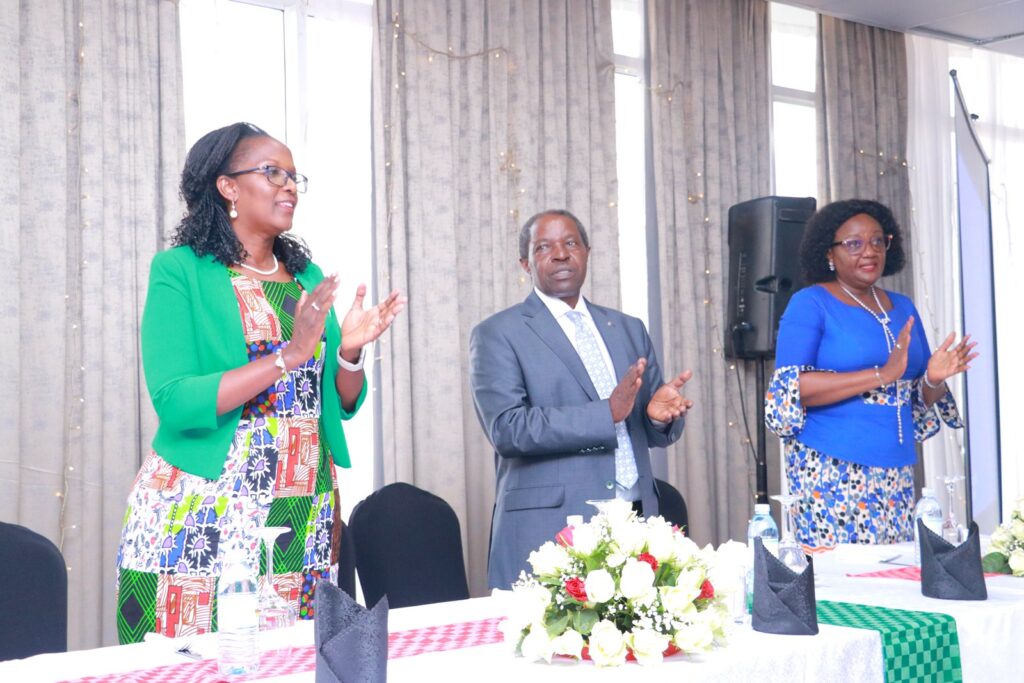
About Bazeyo
Born on June 22nd, 1957, Professor Bazeyo clocked mandatory retirement age of Makerere University on September 22nd 2017 having joined the University in 1993. He was offered a post retirement contract for four years as a Professor, in the Department of Disease Control and Environmental Health running from June 2017 to June 2021.
In March 1998, Prof. Bazeyo was promoted to rank of Senior Lecturer, Makerere University and subsequently secured a promotion to the rank Associate Professor in 2011 and later Professor in 2015.
In September 2009, Professor Bazeyo was named Dean, a position he held until September 2017 when he handed over to the current Dean, Prof. Rhoda Wanyenze upon completion of his term of office.
Professor Bazeyo later rose through the university leadership ranks to become Deputy Vice Chancellor, Finance and Administration, Makerere University and later the Head, Grants Administration and Management Support Unit (GAMSU)
During his tenure in MakSPH, he served as the Head of Department of Disease Control and Environmental Health in 2003.
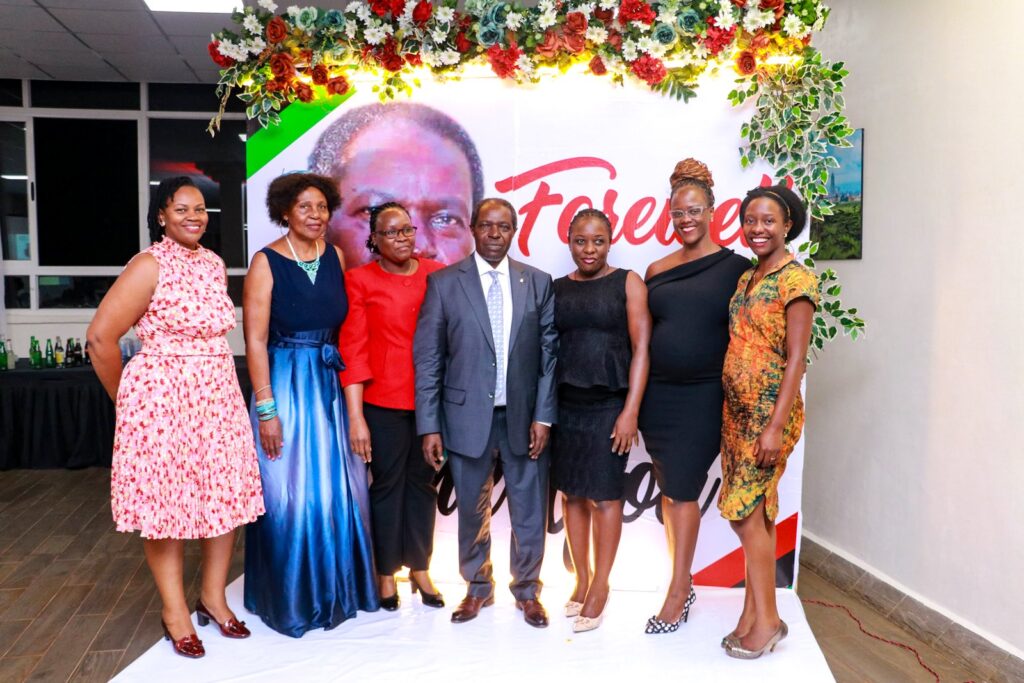
You may like
-


Over 9,200 to graduate at Makerere University’s 76th Graduation
-


76th Graduation Highlights
-


Mak Selected to Host Alliance for African Partnership Africa Office
-


Makerere University School of Public Health Graduates First Cohort of Cost-Effectiveness Analysis Short Course
-


Climate variability found to shape malaria trends in Yumbe District
-


Mak hosts First African Symposium on Natural Capital Accounting and Climate-Sensitive Macroeconomic Modelling
General
Over 9,200 to graduate at Makerere University’s 76th Graduation
Published
10 hours agoon
February 24, 2026
Pomp and colour defined the opening day of the Makerere University’s 76th Graduation Ceremony as thousands gathered to celebrate academic excellence and new beginnings.
The historic ceremony has brought together scholars, families, friends and industry partners in a vibrant celebration of achievement and possibility. Throughout the four-day event, the University will confer degrees and award diplomas to 9,295 graduands in recognition of their dedication and hard work.
Among the graduates, 213 will receive Doctor of Philosophy (PhD) degrees, 2,503 will graduate with Master’s degrees, and 6,343 will earn Bachelor’s degrees. In addition, 206 students will graduate with postgraduate diplomas, while 30 will be awarded undergraduate diplomas.
Of the total number of graduands, 4,262 are female and 5,033 are male. According to Vice Chancellor, this marks the first time in 15 years that male graduands have outnumbered their female counterparts.
The best overall graduand in the Sciences, Esther Ziribaggwa, graduated on the opening day with the Bachelor of Agricultural and Rural Innovation and an impressive Cumulative Grade Point Average (CGPA) of 4.77.

The ceremony marks a proud moment for Makerere University as it continues to nurture top-tier professionals across diverse fields.
While presiding over the graduation, the State Minister for Primary Education, Hon. Dr. Joyce Moriku Kaducu, on behalf of the First Lady and Minister of Education and Sports, Hon. Janet Kataaha Museveni, pointed out that Makerere University is a model institution, where leaders are nurtured, scholars are sharpened, and where dreams have been given direction.
In her address, Hon. Museveni, highlighted Government’s deliberate investment in research, innovation, and infrastructure to strengthen higher education in Uganda.
“The establishment of the Makerere University Research and Innovation Fund (RIF), supports high-impact research and innovation that directly contributes to national priorities and development. Through this initiative, thousands of researchers and innovators have pursued practical, scalable solutions that are transforming communities and key sectors across Uganda,” Mrs Museveni, said.
The Minister also noted that Parliament’s approved a USD 162 million concessional loan to upgrade science, technology, and innovation infrastructure at Makerere University. The funding will facilitate the construction of modern laboratories, smart classrooms, and state-of-the-art facilities for Engineering and Health Sciences, investments expected to position the University firmly within the Fourth Industrial Revolution.
“Government has embarked on the construction of a National Stadium at Makerere University and other institutions of higher learning across the country. This will promote physical education, strengthen talent identification, and boost investment in the sports sector,”

Turning to the graduands, the Minister encouraged them to see themselves not merely as job seekers, but as job creators and solution-makers.
Uganda and Africa need innovators who will modernize agriculture; engineers who will build quality infrastructure; healthcare professionals who will strengthen health systems; and educators who will inspire the next generation,” the Honourable Minister said.
She reminded graduates that they are entering a rapidly changing world shaped by Artificial Intelligence, climate change, and shifting global markets. To thrive, she advised them to remain adaptable, creative, and committed to lifelong learning.
She also encouraged graduates interested in entrepreneurship to tap into the Government’s Parish Development Model, which provides community-based financing and production support.
Quoting Proverbs 3:5–6, the Minister urged the graduates to trust in God as they embark on their next chapter.
She extended special appreciation to the Mastercard Foundation for its 13-year partnership with Makerere University in expanding access to education and empowering young people in Uganda and beyond.
In his speech, the Chancellor of Makerere University, Dr Crispus Kiyonga, urged graduands to harness research, innovation and technology to drive Uganda’s transformation.

“This is a milestone in your lives. You have invested time, discipline and hard work to attain these qualifications. It is important that you derive value from this achievement, not only for yourselves, but for your families and for society.” Dr Kiyonga, said.
Dr. Kiyonga expressed gratitude to the Government of Uganda for its continued financial support to the University, particularly the funding allocated under MakRIF, which he described as critical in strengthening the institution’s research capacity.
“Research plays a very vital role in the development of any community. Makerere as the oldest University in the country is doing a significant amount of research, However, more work is required to mobilize additional resources to further strengthen research at the University.” Dr Kiyonga, noted.
Acknowledging the challenges of a competitive job market, Dr. Kiyonga encouraged graduates to think beyond traditional employment pathways.
“It is true that the job market may not absorb all of you immediately. But the knowledge you have acquired is empowering. You can create work for yourselves, individually or in teams.” Dr Kiyonga, said.
He advised the graduands to embrace discipline, integrity and adaptability in the workplace, and to take advantage of technology and digital platforms to innovate and respond to societal challenges.
“Every development challenge presents an opportunity. Believe that you can apply your knowledge to create solutions with impact.” He said.
Addressing the congregation, the Vice Chancellor, Prof Barnabas Nawangwe, congratulated the graduands, particularly staff and societal leaders on their respective achievements.

“I congratulate all our graduands upon reaching this milestone. In a special way I congratulate the members of staff, Ministers, and Members of Parliament that are graduating today as well as children and spouses of members of staff,” Prof Nawangwe, said.
In his speech, Prof Nawangwe, recognized outstanding PhD students, particularly members of staff. who completed their PhDs in record time without even taking leave from their duties.
He called upon graduates not to despise humble beginnings but rather reflect on the immense opportunities around them and rise to the occasion as entrepreneurs.
“You are all graduating with disciplines that are needed by society. We have equipped you with the knowledge and skills that will make you employable or create your own businesses and employ others. Do not despair if you cannot find employment. Instead, reflect on the immense opportunities around you and rise to the occasion as an entrepreneur,” Prof Nawangwe, said.
Prof Nawangwe called upon the graduands of PhDs to use their degrees to transform the African continent.
“As you leave the gates of Makerere I urge you to put to good use the knowledge you have received from one of the best universities in the World to improve yourselves, your families, your communities, your Country and humanity. Let people see you and know that you are a Makerere alumnus because of the way you carry yourself in society with dignity and integrity. Put your trust in God and honour your parents and opportunities will be opened for you,” Prof Nawangwe, said.
Delivering a key note address, Prof. Nicholas Ozor, the Executive Director of the African Technology Policy Studies Network Nairobi, Kenya ((ATPS). Reminded the graduates that a degree is not a finish line but the beginning of accountability. “The world is a complex, fast changing and deeply unequal. Degrees make you responsible for others not better than them,” Prof Ozor, said.

The 76th Graduation Ceremony of Makerere University will be held from Tuesday 24th to Friday 27th February, 2026. A total of 213 PhDs (87 female, 126 male), 2,503 Masters (1,087 female, 1,416 male), 206 Postgraduate Diplomas (80 female, 126 male), 6,343 Undergraduate Degrees (2,999 female, 3,344 male), and 30 Undergraduate Diplomas (9 female, 21 male) will be graduating from all the Colleges.
Ms. Sarah Aloyo and Ms. Nakato Dorothy both students of the Bachelor of Procurement and Supply Chain Management emerged as the best in the Humanities and Best Overall students with a CGPA of 4.93. Mr. Ssewalu Abdul, a Bachelor of Leisure and Hospitality Management student emerged second best in the Humanities with a CGPA 4.90. Ms. Esther Ziribaggwa emerged as the best student in the Sciences with a CGPA of 4.77 in the Bachelor of Agricultural and Rural Innovation, while Mr. Simon Mungudit emerged second best in the Sciences with a CGPA of 4.76 in the Bachelor of Science in Petroleum Geoscience and Production.
Commencement Speakers
- Day 1 – Prof. Nicholas Ozor, the Executive Director of the African Technology Policy Studies Network, Nairobi, Kenya
- Day 2 – Prof. Dr. Maggie Kigozi, Chairperson Makerere University Endowment Fund Board
- Day 3 – Dr. Patricia Adongo Ojangole, Managing Director, Uganda Development Bank Limited
- Day 4 – Ms. Reeta Roy, Former President & Chief Executive Officer, Mastercard Foundation
The 76th Graduation Ceremony will be held at the Freedom Square following the schedule below:
Tuesday, 24th February, 2026
College of Agricultural and Environmental Sciences (CAES)
College of Computing and Information Sciences (CoCIS)
College of Education and External Studies (CEES)
School of Law (SoL)
Livestream Link for Day 1: https://youtube.com/live/wVGPA0FJ9pU
Wednesday, 25th February, 2026
College of Health Sciences (CHS)
College of Natural Sciences (CoNAS)
College of Veterinary Medicine, Animal Resources and Bio-security (CoVAB)
School of Public Health (SPH)
Thursday, 26th February, 2026
Makerere University Business School (MUBS)
College of Business and Management Sciences (CoBAMS)
Friday, 27th February, 2026
College of Engineering, Design, Art and Technology (CEDAT)
College of Humanities and Social Sciences (CHUSS)
Institute of Gender and Development Studies (IGDS)
Makerere Institute of Social Research (MISR)
General
Mak Selected to Host Alliance for African Partnership Africa Office
Published
2 days agoon
February 23, 2026
Makerere University has been selected to host the Africa Office of the Alliance for African Partnership (AAP). The significant milestone that underscores Makerere’s role in fostering research, innovation, and global collaborations across the continent was announced at a meeting of the University’s Central Management with an AAP delegation on 23rd February 2026.
Makerere’s selection was based on the University’s robust commitment, alignment with the AAP’s Strategic Plan, and proven ability to manage consortium activities. The AAP, which was initiated by Michigan State University (MSU) in collaboration with Ten African Universities and agricultural policy research networks in 2016, targets critical challenges in education, youth empowerment, health and nutrition, agri-food systems, science and technology, water, energy, environment, and culture and society.
Addressing the delegation consisting of AAP Co-Directors from MSU, Dr. Jose Jackson-Malete and Dr. Amy Jamison, accompanied by newly-appointed Director of the AAP Africa Office, Dr. Racheal Ddungu Mugabi and Ms. Clare Cheromoi, the Vice Chancellor, Prof. Barnabas Nawangwe who appreciated the choice of Makerere to host the Africa Office said:
“One of the greatest challenges facing African universities is PhD training, particularly supervisory capacity. Through partnerships such as the Alliance for African Partnership we can leverage international expertise to strengthen supervision—whether through training supervisors or through joint supervision arrangements.”
Prof. Nawangwe equally applauded joint initiatives such as the Grant Writing and Publication project, which gave rise to the establishment of a Writing Centre that he said can be used to build capacity in AAP member universities with Makerere as the hub. Officially launched on 21st March 2023, the project is living up to its expectation of becoming a springboard for strong postdoctoral collaborative research for both institutions and other US universities.
Dr. Titus Awokuse, Vice Provost and Dean for International Studies and Programs at Michigan State University (MSU) who attended virtually, reiterated that Makerere’s selection reflects its long-standing commitment to advancing African higher education, research excellence, and meaningful global collaboration.
Reflecting on the origins of the Alliance for African Partnerships (AAP), Dr. Awokuse explained that nearly a decade ago, MSU initiated a transformative conversation in Atlanta centered on the question: How should we partner differently? From this dialogue emerged AAP—an Africa-centered consortium that now brings together 12 institutions across Africa and the United States.

He emphasized that AAP is grounded in equity, mutual benefit, shared leadership, and deep respect for African priorities and expertise. Since its founding, MSU has served as convener and key supporter, working with member institutions to strengthen research collaboration, promote faculty and student engagement, and address shared development priorities.
Dr. Awokuse underscored that AAP’s success is the result of collective vision and commitment, not the efforts of a single institution. He paid tribute to Lilongwe University of Agriculture and Natural Resources for hosting the Africa Office in its early years and acknowledged the foundational leadership of the inaugural Africa Office Director.
He described the launch of the Africa Office at Makerere University as a significant milestone that reinforces Africa-led leadership, strengthens regional collaboration, and enhances responsiveness to emerging opportunities. MSU, he affirmed, remains fully committed to AAP and to working closely with Makerere and all consortium partners to expand collaborative research, nurture the next generation of scholars, and advance Africa-led solutions to global challenges.
The newly-appointed AAP Africa Office Director, Dr. Racheal Ddungu Mugabi is a member of faculty in the Department of Development Studies, Institute of Gender and Development Studies. Her work on intersectional inequalities in Uganda and other Global South regions uniquely positions her to drive collaborative research and partnerships at the Africa Office.
Initially founded by ten African Universities and MSU, AAP now comprises eleven African members including; the African Network of Agricultural Policy Institutes (ANAPRI)-Zambia, Egerton University-Kenya, Lilongwe University of Agriculture and Natural Resources (LUANAR)-Malawi, Makerere University-Uganda, United States International University-Africa-Kenya, Universite Cheikh Anta Diop-Senegal, Universite Yambo Ouologuem de Bamako-Mali, University of Botswana-Botswana, University of Dar es Salaam-Tanzania, University of Nigeria, Nsukka-Nigeria, and the latest, University of Pretoria-South Africa.
These Universites collaborate under Focal Points to advance policy-relevant research and sustainable development. Makerere University’s Focal Point is Prof. Robert Wamala, Director of Research, Innovations and Partnerships (DRIP).
Addressing the University Management, Dr. Jackson-Malete outlined the African Futures Research Leadership Program, which nurtures early career scholars through mentorship and skill-building as one of AAP’s flagship programs. She noted that the Program that prioritizes female participants or men committed to promoting women in higher education has for the first time during its fifth cohort admitted the first male, Dr. Alfadaniels Mabingo from the Department of Performing Arts and Film, Makerere University.
The AAP Africa Office at Makerere will coordinate activities, boost research collaboration, mobilize resources, and enhance global engagements for socio-economic transformation. This aligns with Makerere‘s broader goals of leveraging international expertise to build resilient institutions.
View more photos from the event: https://flic.kr/s/aHBqjCLjoA
Trending
-

 Humanities & Social Sciences2 days ago
Humanities & Social Sciences2 days agoMeet Najjuka Whitney, The Girl Who Missed Law and Found Her Voice
-

 Health6 days ago
Health6 days agoUganda has until 2030 to end Open Defecation as Ntaro’s PhD Examines Kabale’s Progress
-

 Agriculture & Environment5 days ago
Agriculture & Environment5 days agoUganda Martyrs Namugongo Students Turn Organic Waste into Soap in an Innovative School Project on Sustainable Waste Management
-

 General7 days ago
General7 days agoMastercard Foundation Scholars embrace and honour their rich cultural diversity
-

 Health2 weeks ago
Health2 weeks agoCall for Applications: Short Course in Molecular Diagnostics March 2026
